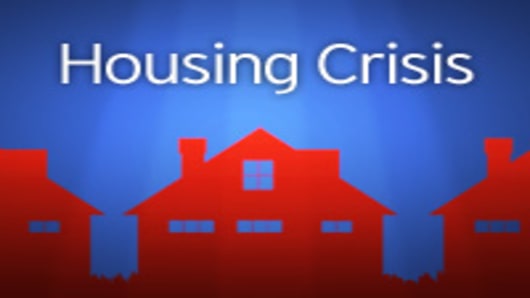Figuring out where mortgage rates are headed used to be easy. But then came the housing slump--and the credit crisis--and everything changed.
"The reality is that it used to be relatively easy to predict where mortgage rates were going to go," says Mike Larson, real estate analyst for Money & Markets, a business website. "You keep your eye on things like the broader economy. More recently, it's been almost impossible to predict. The thing that's going to make a lasting impact on mortgage rates is whether you can get through this period of credit turmoil."
The housing slump triggered a wave of defaults on mortgages and mortgage-related debt. That hit the banks hard and made them reluctant to lend--even to people and companies with good credit.
The Federal Reserve has been aggressively cutting rates since August to keep the economy out of a recession--and more recently--to encourage banks to lend again. But it's been a slow process.
Usually when the Fed cuts interest rates, mortgage rates fall as well. But in recent months, mortgage rates have remained stubbornly high even while other rates continued to fall.
Mortgage rates did, in fact, fall this week after the Fed cut rates again and took other steps to ease credit. But if recent history is any guide, the decline in mortgage rates may not last long.
Instead, consumers will see lower rates for home-equity lines of credit and credit cards, which are more closely tied to Fed actions.
"In terms of home equity lines of credit, that is really the direct effect that the rate cut is going to have. It has kind of a delayed effect on long-term rates," said Arnold Martin, CEO of Absolute Lending and Mortgage of Fayetteville, Ga. "If people have existing lines of credit and they hold onto it they should see in the next 30 to 60 days a reduction in interest rates."
On mortgages, banking industry leaders say rate sheets often change several times during the course of a day, making the current situation all the more urgent for borrowers.
Mortgages are moved by a variety of factors, with the most important in recent months being the spread, or difference, between 10-year Treasury bond rates and securities issued by secondary mortgage agencies Fannie Mae and Freddie Mac . The difference is a direct reflection of the market's appetite for risk, and the closer the spread gets the more likely mortgage rates are likely to fall.
Since the central bank lowered its Fed funds rate by three-quarters of a point Tuesday, rates for 30-year mortgages dropped from 5.96 percent to 5.66 percent, according to Bankrate.com. That's down from 6.37 percent four weeks ago.
The Fed also last week agreed to pump $200 billion into the mortgage market, and raised the loan limits that the government-backed entities Fannie Mae and Freddie Mac can back up.
But getting banks to loan money has been one of the trickiest parts of the credit crunch, with risk-aversion running high in the wake of all the defaults on subprime mortgages and the billions of dollar in writedowns they have caused to major lenders and those that issued bonds guaranteeing the loans.
"You can hope the Fed's finally solved the problems. Unfortunately that's really going to depend on investor confidence," Larson said. "Is this the end of the cycle? Is the Fed finally getting ahead of the curve, or is there something else looming over the horizon?"
Indeed, the real test of what will happen to mortgages is simply time. Since the subprime crisis broke, unpredictability has become the norm for the financial markets.
Analysts are looking for rates to find some holding pattern to indicate that lower mortgages will stick around for a while.
"You want to see credit spread reverse this trend of spiking," Larson said. "You'd want to see them not just spike and come down and hold some of their gains, you'd want to see them spike, some down and keep falling."
In the meantime, Martin advises consumers to play it smart.
Refinancing is the best possible option for those with adjustable-rate mortgages that are about to reset. But even that option has become problematic for homeowners in the many markets where property values have decreased substantially.
In those cases, Martin said homeowners should check into 15- and 20-year mortgages as a way to get ahead of the drop in property values. And he also advised seeking refinancings that have no closing costs.



